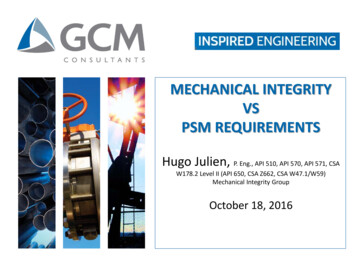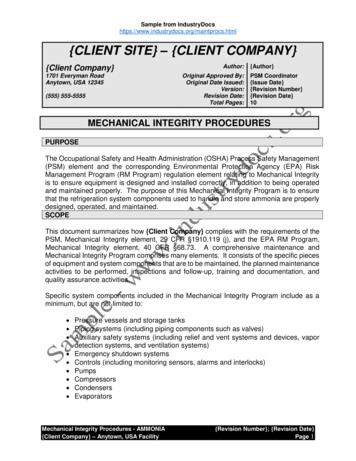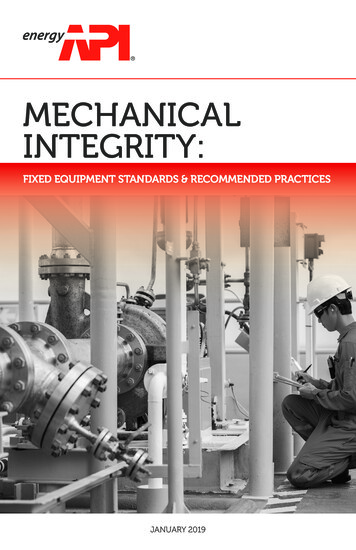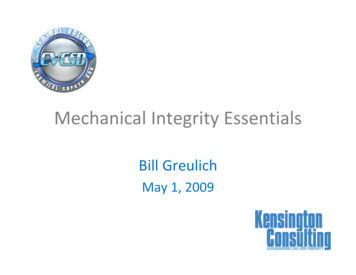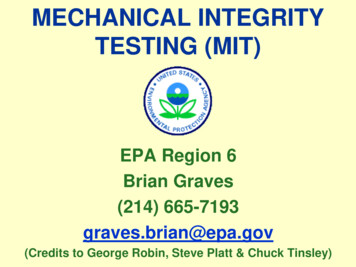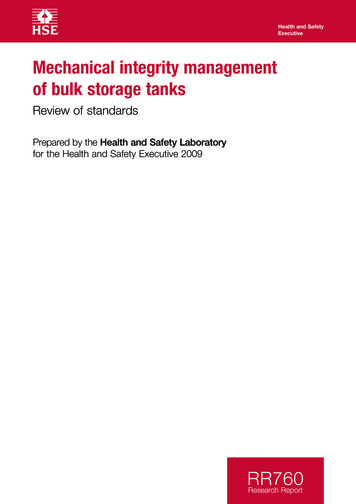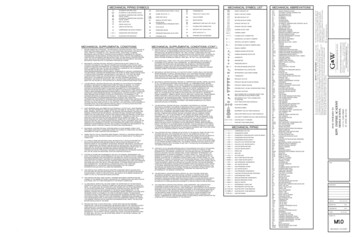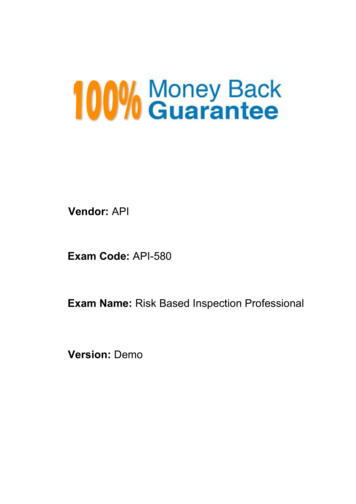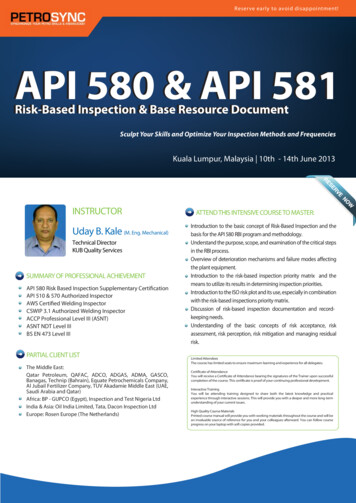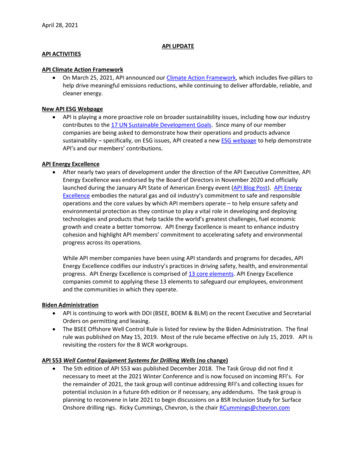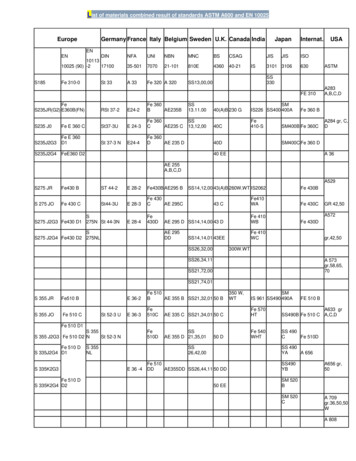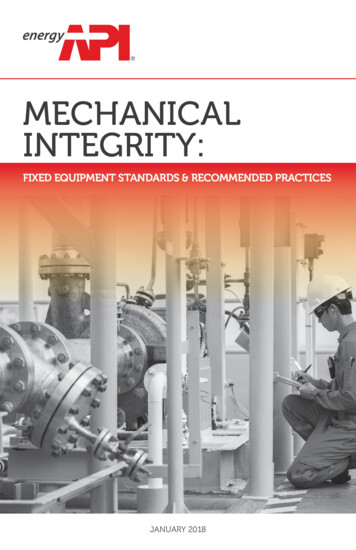
Transcription
MECHANICALINTEGRITY:FIXED EQUIPMENT STANDARDS & RECOMMENDED PRACTICESJANUARY 2018
CONTENTSAN INTRODUCTION TO MECHANICAL INTEGRITY:FIXED EQUIPMENT.2EQUIPMENT.5Pressure Vessels.5Piping Systems.6Heat Transfer Equipment.8Storage Tanks. 11Pressure Relief Devices.14PROCESSES.16Risk-Based Inspection.16Fitness-For-Service. 17Damage Mechanisms.18Integrity Operating Windows. 20CORROSION AND MATERIALS.21Welding.21Corrosion and Materials. 22TIMELINE OF FIRST EDITIONS OF API MECHANICALINTEGRITY STANDARDS & RPs.27OTHER NON-API MECHANICALINTEGRITY RESOURCES.31UPCOMING EVENTS.32MECHANICAL INTEGRITY: FIXED EQUIPMENT STANDARDS & RECOMMENDED PRACTICES1
AN INTRODUCTION TO MECHANICALINTEGRITY: FIXED EQUIPMENTMechanical Integrity (MI) can be defined as the management of critical processequipment to ensure it is designed and installed correctly and that it isoperated and maintained properly. MI is 1 of the 14 elements included in the OSHAProcess Safety Management standard. MI includes equipment/assets such as pressurevessels, storage tanks, piping systems, and associated hardware (valves, fittings, etc.),relief devices, and emergency shutdown/control systemsMI encompasses the activities necessary to ensure that equipment/assets are designed,fabricated, installed, operated and maintained in a way that provides the desiredperformance in a safe, environmentally protected, and reliable fashion.In the early 1900s, the need to protect workers and the public from the hazards ofboilers and pressurized equipment became apparent, so the industry began to developdesign standards. After World War II, a number of industry consensus standards weredeveloped by the National Board Inspection Code (NBIC). By the 1980s, theAmerican Petroleum Institute (API) led industry efforts to develop and implementTIMELINE OF IMPORTANT MI EVENTSAPI RP 750 Managementof Process Hazards . . . . . . 1991 1984 19901958API 510 - Pressure VesselInspection CodeBhopal DisasterAPI Std 653 -Tank Inspection, Repair,Alteration, and ReconstructionMECHANICAL INTEGRITY: FIXED EQUIPMENT STANDARDS & RECOMMENDED PRACTICES2
important MI standards, while the federal government also turned its regulatoryattention to MI. API, industry, and the regulators have addressed MI head-onsince the early-90s, particularly through the Occupational Safety and HealthAdministration’s (OSHA) Process Safety Management (PSM) program and theEnvironmental Protection Agency’s (EPA) Risk Management Program (RMP),as well as many additional Standards and Recommended Practices (RPs)published by API.API and AFPM jointly manage the Advancing Process Safety Initiative whichis a joint effort to further advance process safety improvements in refineries andpetrochemical plants by providing industry with more opportunities tocommunicate and share experiences and knowledge. Through this partnership,API and AFPM collect process safety performance metrics, share process safetyevent information, produce and share Practices Sharing and HazardIdentification documents, host Regional Networks meetings, address issuespecific topics such as Mechanical Integrity and Human Reliability. API alsooperates a program that assesses a site’s Process Safety systems using independentand credible third party teams of industry-qualified process safety expertassessors. Through the use of industry developed protocols, the assessmentsOSHA PSMFinal RuleChemicalSafety Boardformed API 570 - PipingInspection Code API Publ 581 Risk-Based Inspection Base Resource Document 2010 OSHA RefineryNational EmphasisProgram Effective Date 2012 2007 2000 1993 2006Baker PanelRefinerySafety Review199819991992 API &AFPMAdvancingProcessSafetyProgramsfoundedEPA Risk ManagementProgram Final RuleFirst API SiteAssessmentMECHANICAL INTEGRITY: FIXED EQUIPMENT STANDARDS & RECOMMENDED PRACTICES3
evaluate both the quality of the written programs and the effectiveness of fieldimplementation, including a site’s Mechanical Integrity program.API has taken an active role in the creation and propagation of MI information andmaterials. API committees create Standards and RPs that address MI, largely in theareas of inspection and repair of pressure vessels, aboveground storage tanks,equipment reliability, corrosion, mechanics, and reducing capital and maintenancecosts.These documents provide expectations on implementation and compliance, andmany contain requirements in the form of “shall” statements, as determined byindustry consensus committees. The creation of these industry-wide standards allowsfor procedures and practices to seamlessly continue at a company despite challengespresented by a dynamic and changing workforce. Institutional knowledge is nolonger limited to a few senior employees, and “gut feeling” is replaced with tried-andtrue methods contained in the Standards and RPs. Because they must be applicableto many different sites, API committees write their documents in a way that stillallows managers to operate in the most safe and efficient manner as dictated by theirown facility’s needs.The motivation for writing API MI Standards and RPs was based on safety,competition, and budgeting challenges, as well as myriad external pressures, but theadoption of these documents has led to more valuable inspection data, increasedability to handle changing process conditions, and the scheduling and budgetingbenefit of planned inspections, among other things. API Standards and RPs areperiodically reviewed so that they remain relevant and valuable to the industry, and areview of past standards and updates shows how well the industry has adapted tochanging times and MI science.This brochure is designed to acquaint the reader with the MI resources available inAPI Standards, Recommended Practices, and other helpful resources. The informationis organized topically, and “companion” documents meant to complement oneanother are highlighted and listed together.MECHANICAL INTEGRITY: FIXED EQUIPMENT STANDARDS & RECOMMENDED PRACTICES4
EQUIPMENTPressure VesselsAPI 510Pressure Vessel Inspection Code: In-Service Inspection, Rating, Repair,and AlterationCovers the in-service inspection, repair, alteration, and rerating activities forpressure vessels and the pressure-relieving devices protecting these vessels.This inspection code applies to most refining and chemical process vessels that havebeen placed in service. This includes:vessels constructed in accordance with an applicable construction code;vessels constructed without a construction code (non-code)—a vessel not fabricatedto a recognized construction code and meeting no known recognized standard;vessels constructed and approved as jurisdictional special based upon jurisdictionacceptance of particular design, fabrication, inspection, testing, and installation;non-standard vessels—a vessel fabricated to a recognized construction codebut has lost its nameplate or stamping.Companion document to RP 57210th Edition May 2014RP 572Inspection Practices for Pressure VesselsSupplements API 510 by providing pressure vessel inspectors with information thatcan improve skills and increase basic knowledge of inspection practices. This recommended practice (RP) describes inspection practices for the various types of pressurevessels (e.g. drums, heat exchangers, columns, reactors, air coolers, spheres) used inpetroleum refineries and chemical plants. This RP addresses vessel components,inspection planning processes, inspection intervals, methods of inspection andassessment, methods of repair, records, and reports. API 510 has requirements andexpectations for inspection of pressure vessels.Companion document to API 5104th Edition December 2016MECHANICAL INTEGRITY: FIXED EQUIPMENT STANDARDS & RECOMMENDED PRACTICES5
Piping SystemsAPI 570Piping Inspection Code: In-Service Inspection, Rating, Repair, and Alterationof Piping SystemsCovers inspection, rating, repair, and alteration procedures for metallic and fiberglassreinforced plastic (FRP) piping systems and their associated pressure relievingdevices that have been placed in service. This inspection code applies to allhydrocarbon and chemical process piping covered in 1.2.1 that have been placed inservice unless specifically designated as optional per 1.2.2. This publication does notcover inspection of specialty equipment including instrumentation, exchanger tubes,and control valves.However, this piping code could be used by owner/users in other industries and otherservices at their discretion. Process piping systems that have been retired from serviceand abandoned in place are no longer covered by this “in-service inspection” Code.However abandoned in place piping may still need some amount of inspection and/orrisk mitigation to assure that it does not become a process safety hazard because ofcontinuing deterioration. Process piping systems that are temporarily out of service buthave been mothballed (preserved for potential future use) are still covered by this Code.Companion document to RP 5744th Edition February 2016RP 574Inspection Practices for Piping System ComponentsSupplements API 570 by providing piping inspectors with information that canimprove skill and increase basic knowledge of inspection practices. This recommended practice describes inspection practices for piping, tubing, valves (other thancontrol valves), and fittings used in petroleum refineries and chemical plants.Common piping components, valve types, pipe joining methods, inspectionplanning processes, inspection intervals and techniques, and types of records aredescribed to aid the inspectors in fulfilling their role implementing API 570. Thispublication does not cover inspection of specialty items, including instrumentation,furnace tubulars, and control valves.Companion document to API 5704th Edition November 2016MECHANICAL INTEGRITY: FIXED EQUIPMENT STANDARDS & RECOMMENDED PRACTICES6
RP 578Material Verification Program for New and Existing Alloy Piping SystemsProvides the guidelines for a material and quality assurance system to verify that thenominal composition of alloy components within the pressure envelope of a pipingsystem is consistent with the selected or specified construction materials to minimizethe potential for catastrophic release of toxic or hazardous liquids or vapors.This RP provides the guidelines for material control and material verificationprograms on ferrous and nonferrous alloys during the construction, installation,maintenance, and inspection of new and existing process piping systems covered bythe ASME B31.3 and API 570 piping codes. This RP applies to metallic alloymaterials purchased for use either directly by the owner/user or indirectly throughvendors, fabricators, or contractors and includes the supply, fabrication, anderection of these materials. Carbon steel components specified in new or existingpiping systems are not specifically covered under the scope of this document unlessminor/trace alloying elements are critical to component corrosion resistance orsimilar degradation.2nd Edition March 2010MECHANICAL INTEGRITY: FIXED EQUIPMENT STANDARDS & RECOMMENDED PRACTICES7
Heat Transfer EquipmentStd. 530Calculation of Heater-Tube Thickness in Petroleum RefineriesSpecifies the requirements and gives recommendations for the procedures anddesign criteria used for calculating the required wall thickness of new tubes andassociated component fittings for fired heaters for the petroleum, petrochemical,and natural gas industries. These procedures are appropriate for designing tubes forservice in both corrosive and non-corrosive applications. These procedures havebeen developed specifically for the design of refinery and related fired heater tubes(direct-fired, heat-absorbing tubes within enclosures). These procedures are notintended to be used for the design of external piping. This standard does not giverecommendations for tube retirement thickness; Annex A describes a technique forestimating the life remaining for a heater tube.7th Edition April 2015RP 538Industrial Fired Boilers for General Refinery and Petrochemical ServiceSpecifies requirements and gives recommendations for design, operation, maintenance, and troubleshooting considerations for industrial fired boilers used inrefineries and chemical plants. It covers waterside control, combustion control,burner management systems (BMSs), feedwater preparation, steam purity, emissions, etc.1st Edition October 2015MECHANICAL INTEGRITY: FIXED EQUIPMENT STANDARDS & RECOMMENDED PRACTICES8
Std. 560Fired Heaters for General Refinery ServiceSpecifies requirements and gives recommendations for the design, materials,fabrication, inspection, testing, preparation for shipment, and erection of firedheaters, air preheaters (APHs), fans, and burners for general refinery service.Covered sections include Purchaser’s and Vendor’s Responsibilities; DesignConsiderations (Process, Combustion and Mechanical); Materials of Construction;Tubes an
MECHANICAL INTEGRITY: FIXED EQUIPMENT STANDARDS & RECOMMENDED PRACTICES 2 AN INTRODUCTION TO MECHANICAL INTEGRITY: FIXED EQUIPMENT M echanical Integrity (MI) can be defined as the management of critical process equipment to ensure it is designed and installed correctly and that it is operated and maintained properly. MI is 1 of the 14 elements included in the OSHA
![API Ballot: [Ballot ID] – API 510 & API 570, Deferrals, Rev05](/img/5/api510andapi570deferralsrev5.jpg)
